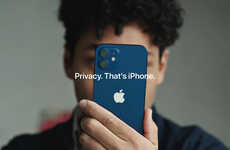'Phubbing' Originated in Australia but is a Global Epidemic
Akihiko Tse — October 13, 2013 — Unique
References: stopphubbing & psfk
Phubbing: the act of snubbing someone in a social setting by looking at your phone instead of paying attention is a popular and much-used term. Look it up.
Unfortunately, searching for the term in a dictionary won't yield any results, since it was a fake word created by Australian ad agency McCann as part of a campaign to highlight the dwindling existence of print dictionaries and raise awareness of the importance of words. As part of its campaign with Macquarie Dictionary, McCann created a website dedicated to phubbing -- stopphubbing.com -- and its devastating effects, like the "fact" that if it were a plague, it would "decimate 6 Chinas," or that 97 per cent of people claimed their food tasted worse as a result of being victimized by phubbing.
The campaign took off, and was picked up in countries as far as the UK, US, Mexico and Latin America. Apart from revitalizing the role of print dictionaries in our lives, Macquarie also wanted to stress the social problems linked to mobile devices and detached from one another we can become because of it.
Unfortunately, searching for the term in a dictionary won't yield any results, since it was a fake word created by Australian ad agency McCann as part of a campaign to highlight the dwindling existence of print dictionaries and raise awareness of the importance of words. As part of its campaign with Macquarie Dictionary, McCann created a website dedicated to phubbing -- stopphubbing.com -- and its devastating effects, like the "fact" that if it were a plague, it would "decimate 6 Chinas," or that 97 per cent of people claimed their food tasted worse as a result of being victimized by phubbing.
The campaign took off, and was picked up in countries as far as the UK, US, Mexico and Latin America. Apart from revitalizing the role of print dictionaries in our lives, Macquarie also wanted to stress the social problems linked to mobile devices and detached from one another we can become because of it.
Trend Themes
1. Revival of Print Dictionaries - The fabricated word campaign highlights the dwindling existence of print dictionaries, creating an opportunity for companies to innovate and revive this traditional medium.
2. Digital Detox - The campaign raises awareness of the social problems linked to mobile devices, presenting an opportunity for businesses to develop products and services that promote digital detox and balance.
3. Language-based Advertising - The success of the campaign demonstrates the power of using language and words in advertising, encouraging businesses to explore creative ways to incorporate language in their marketing strategies.
Industry Implications
1. Advertising and Marketing - The fabricated word campaign showcases the potential for disruptive innovation in the advertising and marketing industry, encouraging companies to think outside the box and create impactful campaigns.
2. Publishing and Printing - The campaign's focus on print dictionaries creates an opportunity for innovation in the publishing and printing industry, prompting companies to explore new ways to engage with readers and revitalize traditional mediums.
3. Technology and Digital Wellness - The campaign's emphasis on the negative effects of mobile devices presents an opportunity for the technology and digital wellness industries to develop products and solutions that promote healthier relationships with technology.
2.3
Score
Popularity
Activity
Freshness






















